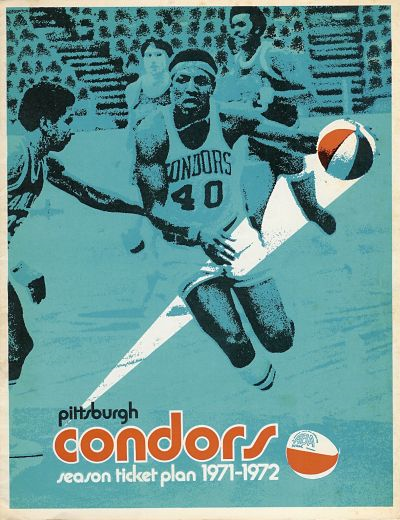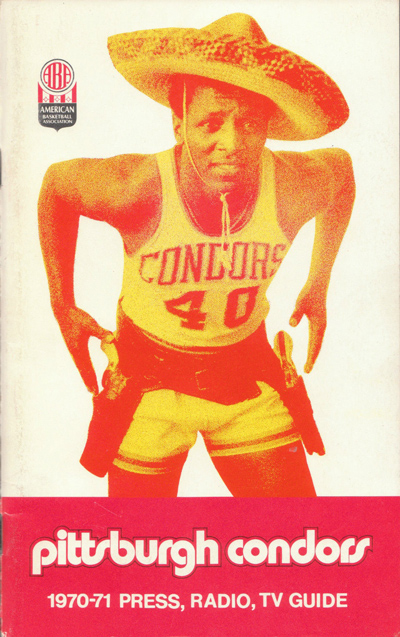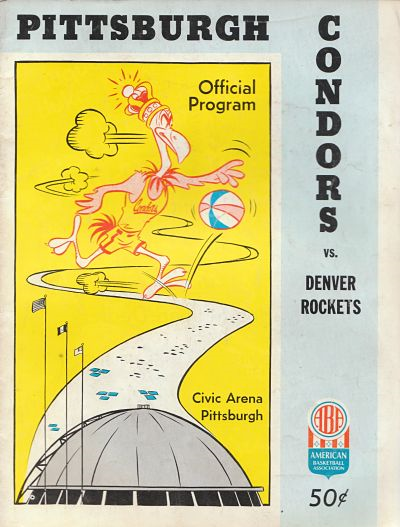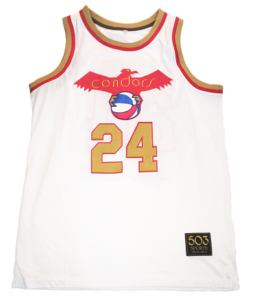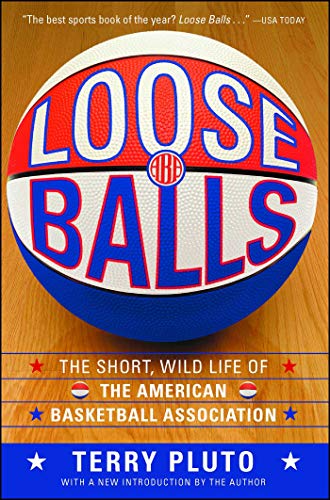American Basketball Association (1970-1972)
Tombstone
Born: Summer 1970 – The Pittsburgh Pipers/Pioneers are re-branded as the Pittsburgh Condors
Folded: June 13, 1972
First Game: October 15, 1970 (105-102 vs. New York Nets)
Last Game: March 29, 1972 (L 128-113 @ Indiana Pacers)
ABA Championships: None
Arena
Pittsburgh Civic Arena(13,500)11970-71 Sporting News American Basketball Association Guide
Opened: 1961
Demolished: 2011-2012
Marketing
Team Colors: Red & Gold21970-71 Sporting News American Basketball Association Guide
Ownership
Owners: Haven Industries (represented by Don Bezahler)
Background
Western Pennsylvania sports fans didn’t care much for the Pittsburgh Condors of the American Basketball Association. But this odd little team has become a cult favorite of ABA collectors and nostalgists thanks to its short life span, deeply weird storylines and some great-looking-but-very-rare memorabilia.
Case in point: a very scarce 1970-71 Condors media guide (like the one below) is currently selling for $500.00 on e-Bay. That’s John Brisker on the cover pictured in sombrero and six shooters. Brisker was a sensational scorer and also a volatile, heat-packing brawler who terrified opponents and teammates alike. No one has seen Brisker since 1978. The most popular theory is that he died in Uganda fighting as a mercenary for Idi Amin.
The Condors were a continuation of the ABA’s Pittsburgh Pipers franchise, which was an equally strange operation. The Condors were one of the ABA’s original eleven franchises in 1967. They were the best team in the league that first season (54-24) and won the inaugural championship, thanks in large part to future Hall-of-Famer Connie Hawkins. But after that first ABA season, Condors owner Gabe Rubin moved the franchise to Minneapolis, where another ABA club had just failed. When the Pipers failed to generate any interest in the Twin Cities, Rubin dragged the club back to Pittsburgh for the ABA’s third season in 1969-70.
Pittsburgh fans were not in a forgiving mood. The 1969-70 Pipers played to a near-empty Civic Arena on most nights. Compounding matters, Hawkins had left for the NBA and the team was a terrible (29-55), a shell of its championship form two winters earlier.
The Name Game
In April 1970 Gabe Rubin unloaded the Pipers on a New York conglomerate named Haven Industries that ran businesses ranging from sugar refining to livery services. Remarkably, the new owners decided to keep the team in Pittsburgh, despite the monolithic apathy of the locals. They decided the problem was the Pipers identity and set about holding a Name The Team contest to re-brand the team. The prize for the winning entry was $500.00 cash.
Law student Don Seymour proposed the name “Pittsburgh Pioneers”, taking 57 words to explain why. Club officials dug Seymour’s concept and named him the winner. Trouble was, a woman named Angela Weaver also submitted the name “Pioneers”. Unlike Seymour, Weaver kept her submission within the 25-word limit stated in the contest rules. And Angela Weaver’s husband was an attorney. And besides that a small downtown Pittsburgh college already used the name Pioneers and threatened to litigate. So the Pipers abandoned their bungled Name The Team contest and became the “Pittsburgh Condors” for no special reason.
On the court, the new management hired former Cincinnati Royals and San Diego Rockets (NBA) head man Jack McMahon to turn around the Condors’ fortunes. Although Brisker and Mike Lewis were named to the 1971 ABA All-Star Game, the Condors struggled to a 36-48 finish and missed the playoffs. Attendance was terrible a 2,806 per game, a figure inflated by massive ticket giveaways, if not outright deception, according to the ABA’s premier historian Arthur Hundhausen of RememberTheABA.com.
Extinction
The Condors’ second and final campaign in the winter of 1971-72 was worse still. GM Mark Binstein canned Jack McMahon after a 4-6 start and named himself Head Coach, despite no previous experience. Attendance plummeted further, fueling rumors that the Condors would disband or relocate while the season was still in progress. After the New Year, the Condors started moving games all over the country rather than play to empty seats in Pittsburgh. There were rumors the Condors could end up in Cincinnati, El Paso, New Haven or San Diego for the 1972-73 season. Pittsburgh’s final “home” game of the 1971-72 season was played in Tucson, Arizona, of all places, on March 28, 1972. In typical fashion, the Condors lost to the Kentucky Colonels in a high scoring shootout 134-132. The club would never play in Pittsburgh again.
The Condors had the worst record in the ABA in 1971-72 at 25-59. The various rumored relocations fell through and the ABA terminated the Condors franchise on June 13, 1972.
Pittsburgh Condors Shop
I earn commissions for purchases made through links in this post
Condors Custom Replica Jersey by Royal Retros
Editor's Pick
Loose Balls
The Short, Wild Life of the American Basketball Association
By Terry Pluto
What do Julius Erving, Larry Brown, Moses Malone, Bob Costas, the Indiana Pacers, the San Antonio Spurs and the Slam Dunk Contest have in common? They all got their professional starts in the American Basketball Association.
The NBA may have won the financial battle, but the ABA won the artistic war. With its stress on wide-open individual play, the adoption of the 3-point shot and pressing defense, and the encouragement of flashy moves and flying dunks, today’s NBA is still—decades later —just the ABA without the red, white and blue ball.
Loose Balls is, after all these years, the definitive and most widely respected history of the ABA. It’s a wild ride through some of the wackiest, funniest, strangest times ever to hit pro sports—told entirely through the (often incredible) words of those who played, wrote and connived their way through the league’s nine seasons..
When you make a purchase through an affiliate link like this one, Fun While It Lasted earns a commission at no additional cost to you. Thanks for your support!
[auction-nudge tool=”listings”]
In Memoriam
Forward John Brisker vanished in Uganda in April 1978. Brisker was declared legally dead in 1985.
Condors Head Coach Jack McMahon passed away at age 60 on June 11, 1989. New York Times obituary.
Links
###

